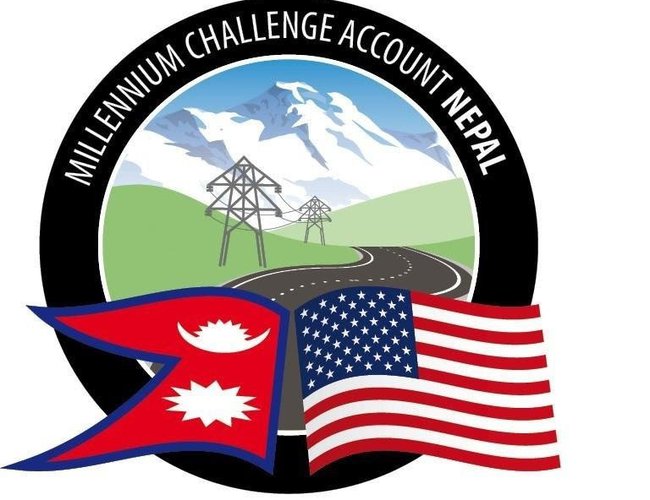
Representatives from different sectors expressed their views that the US grant project, Millennium Challenge Corporation’s Nepal Compact, should be ratified without delay.
Speaking at a discussion about facts and the necessity of MCC on Saturday, they urged the government and concerned authorities to put the facts before the people because they believed that the information currently being disseminated to the people is neither factual nor accurate.
They said that some people and leaders are disseminating false information about MCC without analysis and read the clauses of the compact agreement as per their interest.
Vice-chairman of National Planning Commission Dr. Biswo Nath Poudel said that there was no clause in the compact against Nepal’s sovereignty as it is now rumoured among the people.
“The provision maintained that an international law, not the American law, will be active while implementing the project. This is a positive aspect of the compact. The law of specified countries is activated while taking grants from other countries and donor agencies,” he said.
Poudel said that that the then government had signed MCC agreement based on the country’s needs and necessities for infrastructure development of high capacity transmission lines and roads.
But at the time of implementation of the compact, some leaders and political parties opposed the project to make their political space, he claimed.
“All the countries, India and China are our friends. We are not against any country and neighbour. We want to develop our country by keeping good relationships with all the countries,” he said.
Senior advocate Prof. Dr. Gandhi Pandit said that he did not see any link between the Indo Pacific Strategy (IPS) and MCC and its effect on Nepal’s national security.
Stating that the US had decided to provide grants for transmission and road projects through MCC with the demand of Nepal, he said that the political parties and the government should accept the project respecting the seven-decade long relationship between Nepal and US.
There is no hidden interest of the US in the agreement, he said, adding that both the countries have equal rights to violate the agreement if the project runs against the national sovereignty and rights of both countries.
Prof Dr. Kapil Shrestha said that some political leaders were actively involved in withdrawing the project, spreading negative views among the people.
“Nepal would lose credibility in the international community and US as well if the parties and government fail to implement the project,” he said.
Stating that there is a negative message about the MCC among people, he said that it was a must to disseminate factual information of the compact and win the confidence of people regarding it.
Energy expert Gyanendra Lal Pradhan said that the government should not miss the opportunities for infrastructure development of roads and transmission lines by scrapping the MCC Nepal Compact. “The time is favourable for water and electricity. So, we have to use 100 per cent US grants in the sector,” he said. “Opposing the MCC is politically dishonest. We can only build pressure on the political parties. There is no solution to it. Politics is the only solution.”
The budget spending capacity of the country is still poor and no project is developed in time, he said, adding that the compact should be implemented at the earliest to save the country and develop the hydropower sector.
Political analysts Bijaya Mishra and Arun Kumar Subedi said that it was imperative to table the MCC in the parliament and open discussion on it to be ratified. Subedi expressed their dissatisfaction over the growing controversy in MCC while it was time to ratify the compact and implement it.
Source: The Rising Nepal
- Biden And Netanyahu Discuss Gaza Ceasefire
- Jul 26, 2024
- Paris Olympic Will Start On Saturday
- Jul 25, 2024
- IOC Names Hosts Of Winter Games
- Jul 25, 2024
- 85 % Paddy Plantation Completes Nationwide
- Jul 24, 2024
- Kamala Harris Hits Presidential Campaign Trail
- Jul 24, 2024
















